Critical Evaluation of Toyota's SUV Market Performance in Malaysia
VerifiedAdded on 2023/01/13
|24
|5627
|58
Report
AI Summary
This report offers a critical evaluation of Toyota's performance in the Malaysian automotive market, with a specific focus on the SUV segment. It begins by analyzing the Malaysian automotive market statistics, including market size and key players, followed by an overview of Toyota's history and strategies in the country. The report delves into Toyota's performance over the last five years, particularly within the SUV segment, and provides a PESTEL analysis to assess the external environment. Key success factors for the SUV market are identified, and a competitive analysis is conducted. The report also proposes future market research and concludes with an examination of the Fortuner's objectives, target market, and positioning. The analysis covers various aspects of the automotive industry, including market dynamics, strategic implementations, and competitive positioning, offering valuable insights into Toyota's success and challenges in the Malaysian market.
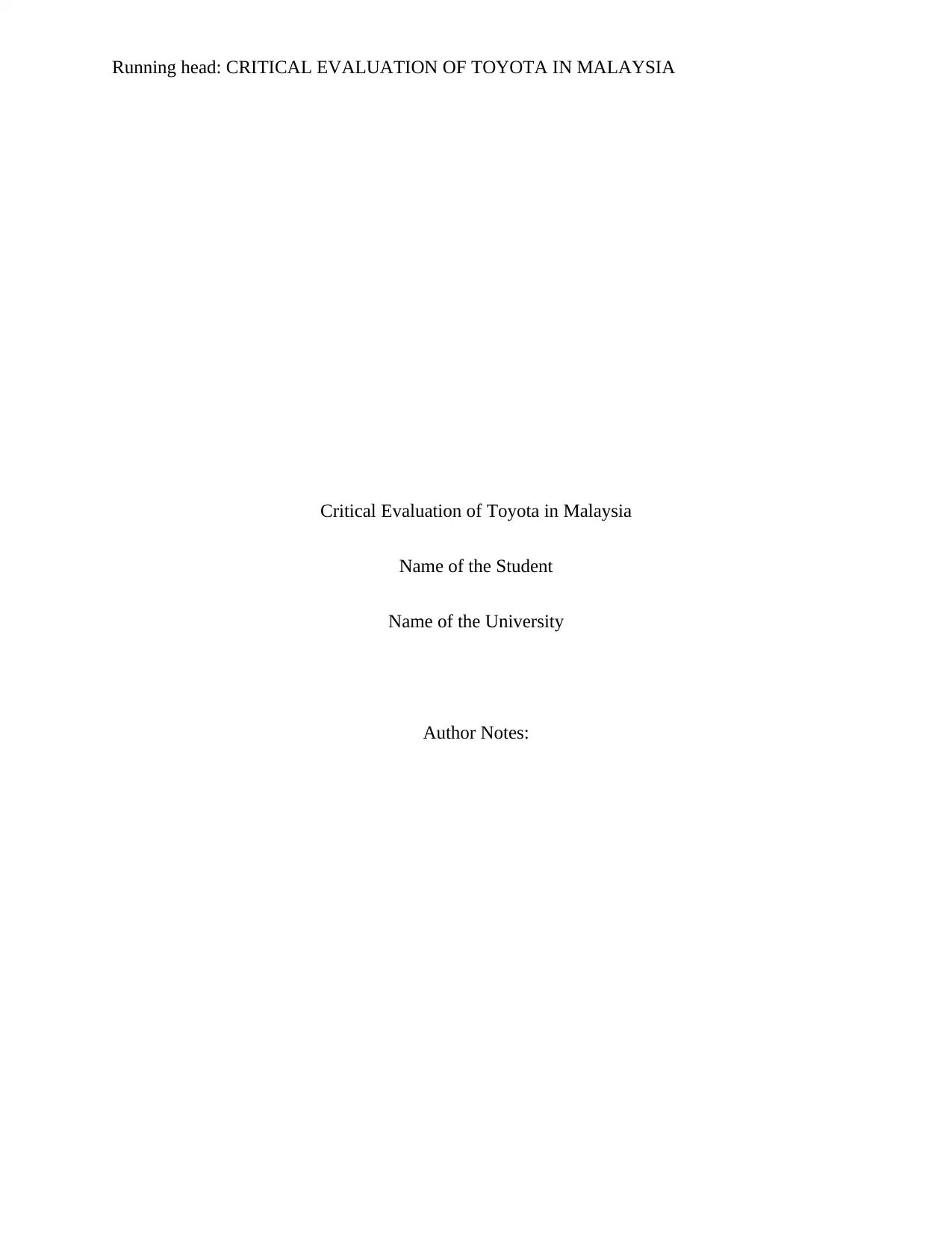
Running head: CRITICAL EVALUATION OF TOYOTA IN MALAYSIA
Critical Evaluation of Toyota in Malaysia
Name of the Student
Name of the University
Author Notes:
Critical Evaluation of Toyota in Malaysia
Name of the Student
Name of the University
Author Notes:
Paraphrase This Document
Need a fresh take? Get an instant paraphrase of this document with our AI Paraphraser
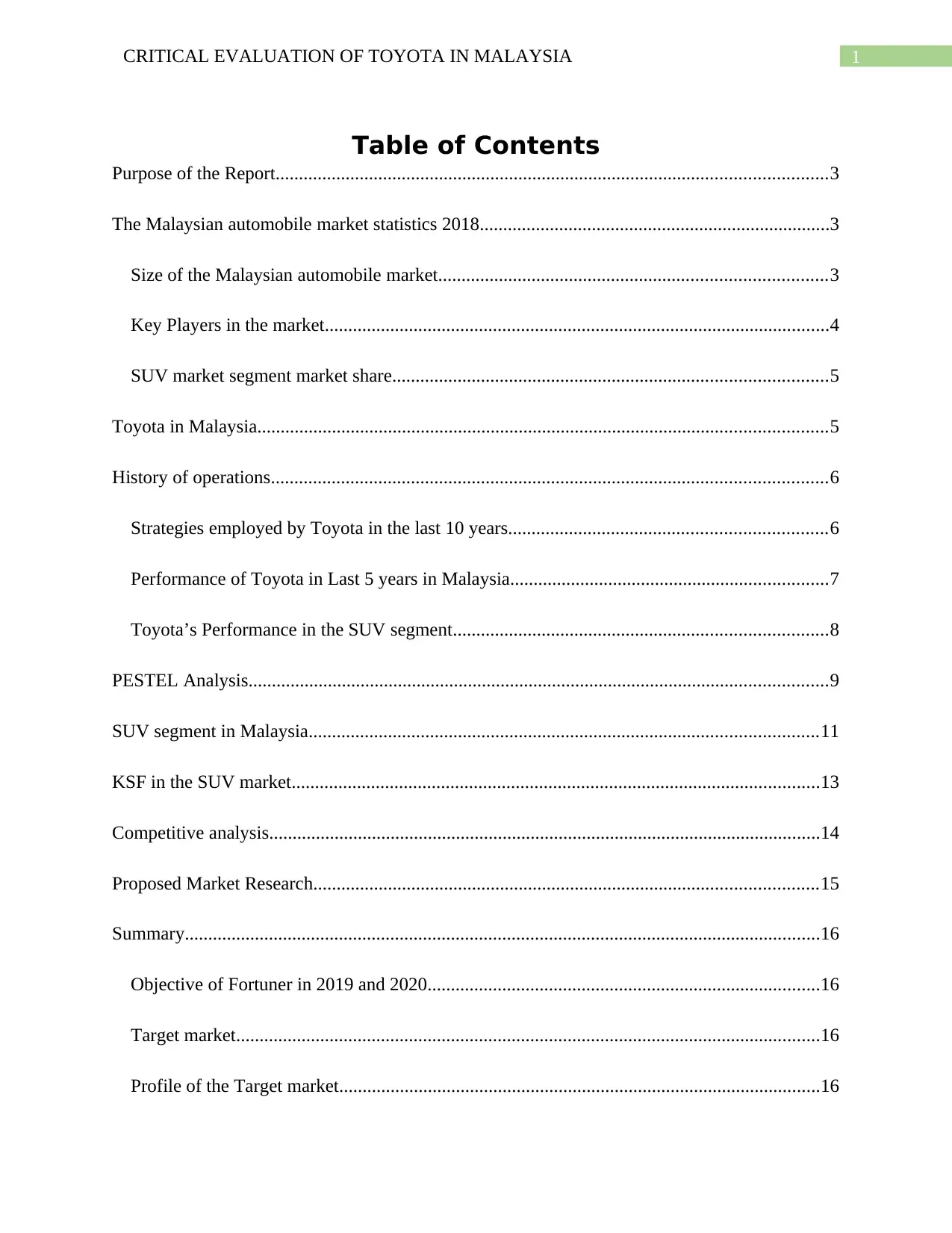
1CRITICAL EVALUATION OF TOYOTA IN MALAYSIA
Table of Contents
Purpose of the Report......................................................................................................................3
The Malaysian automobile market statistics 2018...........................................................................3
Size of the Malaysian automobile market...................................................................................3
Key Players in the market............................................................................................................4
SUV market segment market share.............................................................................................5
Toyota in Malaysia..........................................................................................................................5
History of operations.......................................................................................................................6
Strategies employed by Toyota in the last 10 years....................................................................6
Performance of Toyota in Last 5 years in Malaysia....................................................................7
Toyota’s Performance in the SUV segment................................................................................8
PESTEL Analysis............................................................................................................................9
SUV segment in Malaysia.............................................................................................................11
KSF in the SUV market.................................................................................................................13
Competitive analysis......................................................................................................................14
Proposed Market Research............................................................................................................15
Summary........................................................................................................................................16
Objective of Fortuner in 2019 and 2020....................................................................................16
Target market.............................................................................................................................16
Profile of the Target market.......................................................................................................16
Table of Contents
Purpose of the Report......................................................................................................................3
The Malaysian automobile market statistics 2018...........................................................................3
Size of the Malaysian automobile market...................................................................................3
Key Players in the market............................................................................................................4
SUV market segment market share.............................................................................................5
Toyota in Malaysia..........................................................................................................................5
History of operations.......................................................................................................................6
Strategies employed by Toyota in the last 10 years....................................................................6
Performance of Toyota in Last 5 years in Malaysia....................................................................7
Toyota’s Performance in the SUV segment................................................................................8
PESTEL Analysis............................................................................................................................9
SUV segment in Malaysia.............................................................................................................11
KSF in the SUV market.................................................................................................................13
Competitive analysis......................................................................................................................14
Proposed Market Research............................................................................................................15
Summary........................................................................................................................................16
Objective of Fortuner in 2019 and 2020....................................................................................16
Target market.............................................................................................................................16
Profile of the Target market.......................................................................................................16
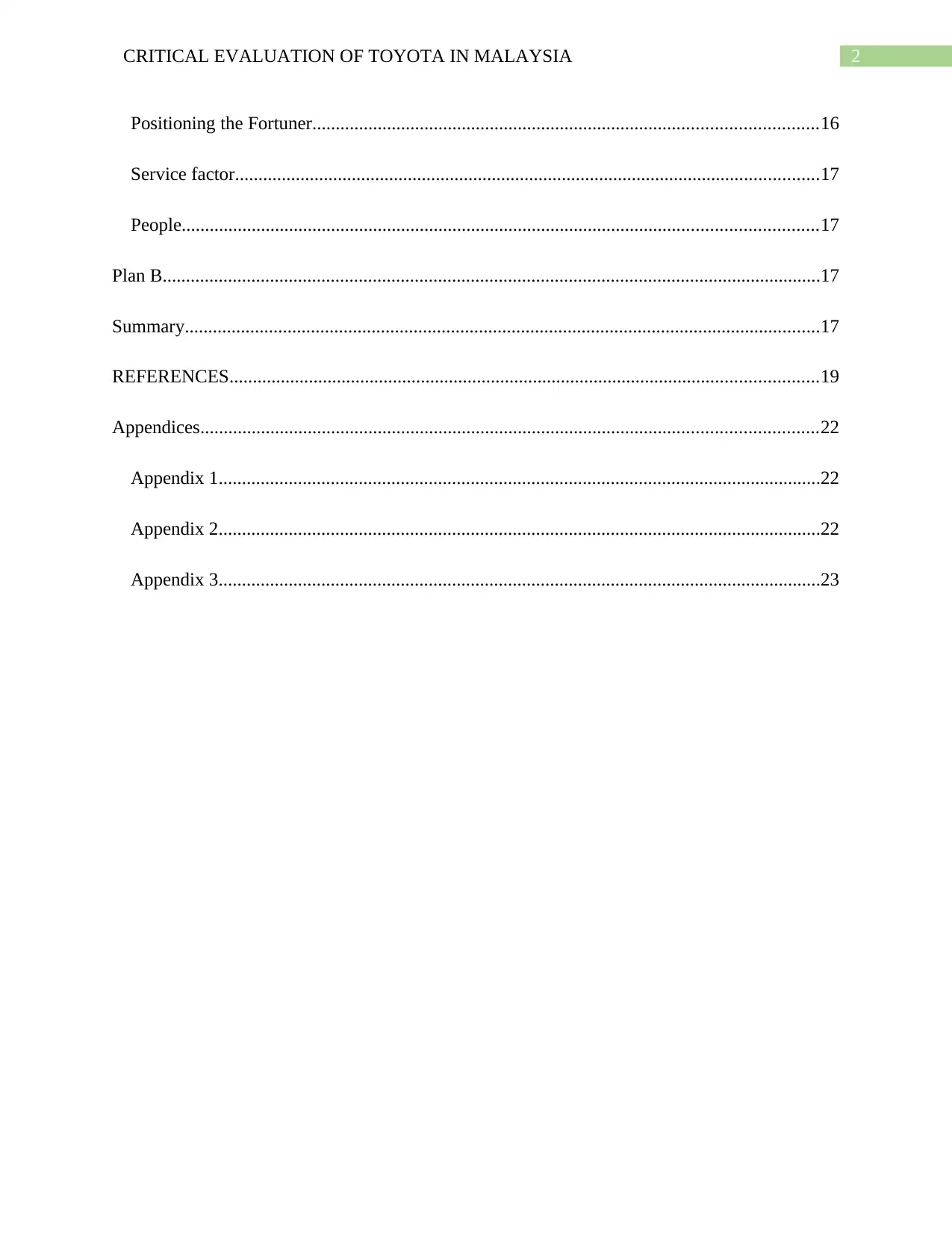
2CRITICAL EVALUATION OF TOYOTA IN MALAYSIA
Positioning the Fortuner............................................................................................................16
Service factor.............................................................................................................................17
People........................................................................................................................................17
Plan B.............................................................................................................................................17
Summary........................................................................................................................................17
REFERENCES..............................................................................................................................19
Appendices....................................................................................................................................22
Appendix 1.................................................................................................................................22
Appendix 2.................................................................................................................................22
Appendix 3.................................................................................................................................23
Positioning the Fortuner............................................................................................................16
Service factor.............................................................................................................................17
People........................................................................................................................................17
Plan B.............................................................................................................................................17
Summary........................................................................................................................................17
REFERENCES..............................................................................................................................19
Appendices....................................................................................................................................22
Appendix 1.................................................................................................................................22
Appendix 2.................................................................................................................................22
Appendix 3.................................................................................................................................23
⊘ This is a preview!⊘
Do you want full access?
Subscribe today to unlock all pages.

Trusted by 1+ million students worldwide
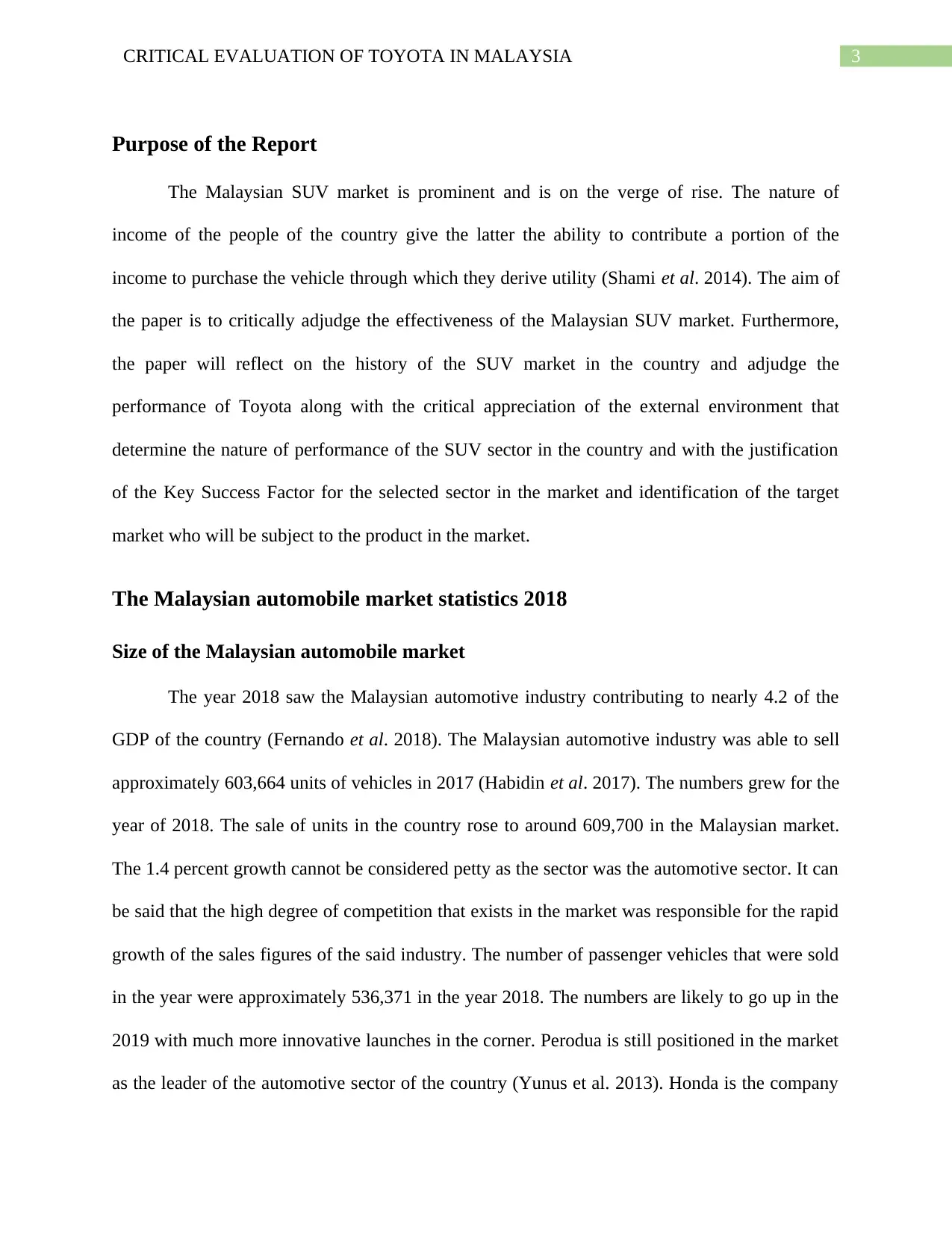
3CRITICAL EVALUATION OF TOYOTA IN MALAYSIA
Purpose of the Report
The Malaysian SUV market is prominent and is on the verge of rise. The nature of
income of the people of the country give the latter the ability to contribute a portion of the
income to purchase the vehicle through which they derive utility (Shami et al. 2014). The aim of
the paper is to critically adjudge the effectiveness of the Malaysian SUV market. Furthermore,
the paper will reflect on the history of the SUV market in the country and adjudge the
performance of Toyota along with the critical appreciation of the external environment that
determine the nature of performance of the SUV sector in the country and with the justification
of the Key Success Factor for the selected sector in the market and identification of the target
market who will be subject to the product in the market.
The Malaysian automobile market statistics 2018
Size of the Malaysian automobile market
The year 2018 saw the Malaysian automotive industry contributing to nearly 4.2 of the
GDP of the country (Fernando et al. 2018). The Malaysian automotive industry was able to sell
approximately 603,664 units of vehicles in 2017 (Habidin et al. 2017). The numbers grew for the
year of 2018. The sale of units in the country rose to around 609,700 in the Malaysian market.
The 1.4 percent growth cannot be considered petty as the sector was the automotive sector. It can
be said that the high degree of competition that exists in the market was responsible for the rapid
growth of the sales figures of the said industry. The number of passenger vehicles that were sold
in the year were approximately 536,371 in the year 2018. The numbers are likely to go up in the
2019 with much more innovative launches in the corner. Perodua is still positioned in the market
as the leader of the automotive sector of the country (Yunus et al. 2013). Honda is the company
Purpose of the Report
The Malaysian SUV market is prominent and is on the verge of rise. The nature of
income of the people of the country give the latter the ability to contribute a portion of the
income to purchase the vehicle through which they derive utility (Shami et al. 2014). The aim of
the paper is to critically adjudge the effectiveness of the Malaysian SUV market. Furthermore,
the paper will reflect on the history of the SUV market in the country and adjudge the
performance of Toyota along with the critical appreciation of the external environment that
determine the nature of performance of the SUV sector in the country and with the justification
of the Key Success Factor for the selected sector in the market and identification of the target
market who will be subject to the product in the market.
The Malaysian automobile market statistics 2018
Size of the Malaysian automobile market
The year 2018 saw the Malaysian automotive industry contributing to nearly 4.2 of the
GDP of the country (Fernando et al. 2018). The Malaysian automotive industry was able to sell
approximately 603,664 units of vehicles in 2017 (Habidin et al. 2017). The numbers grew for the
year of 2018. The sale of units in the country rose to around 609,700 in the Malaysian market.
The 1.4 percent growth cannot be considered petty as the sector was the automotive sector. It can
be said that the high degree of competition that exists in the market was responsible for the rapid
growth of the sales figures of the said industry. The number of passenger vehicles that were sold
in the year were approximately 536,371 in the year 2018. The numbers are likely to go up in the
2019 with much more innovative launches in the corner. Perodua is still positioned in the market
as the leader of the automotive sector of the country (Yunus et al. 2013). Honda is the company
Paraphrase This Document
Need a fresh take? Get an instant paraphrase of this document with our AI Paraphraser
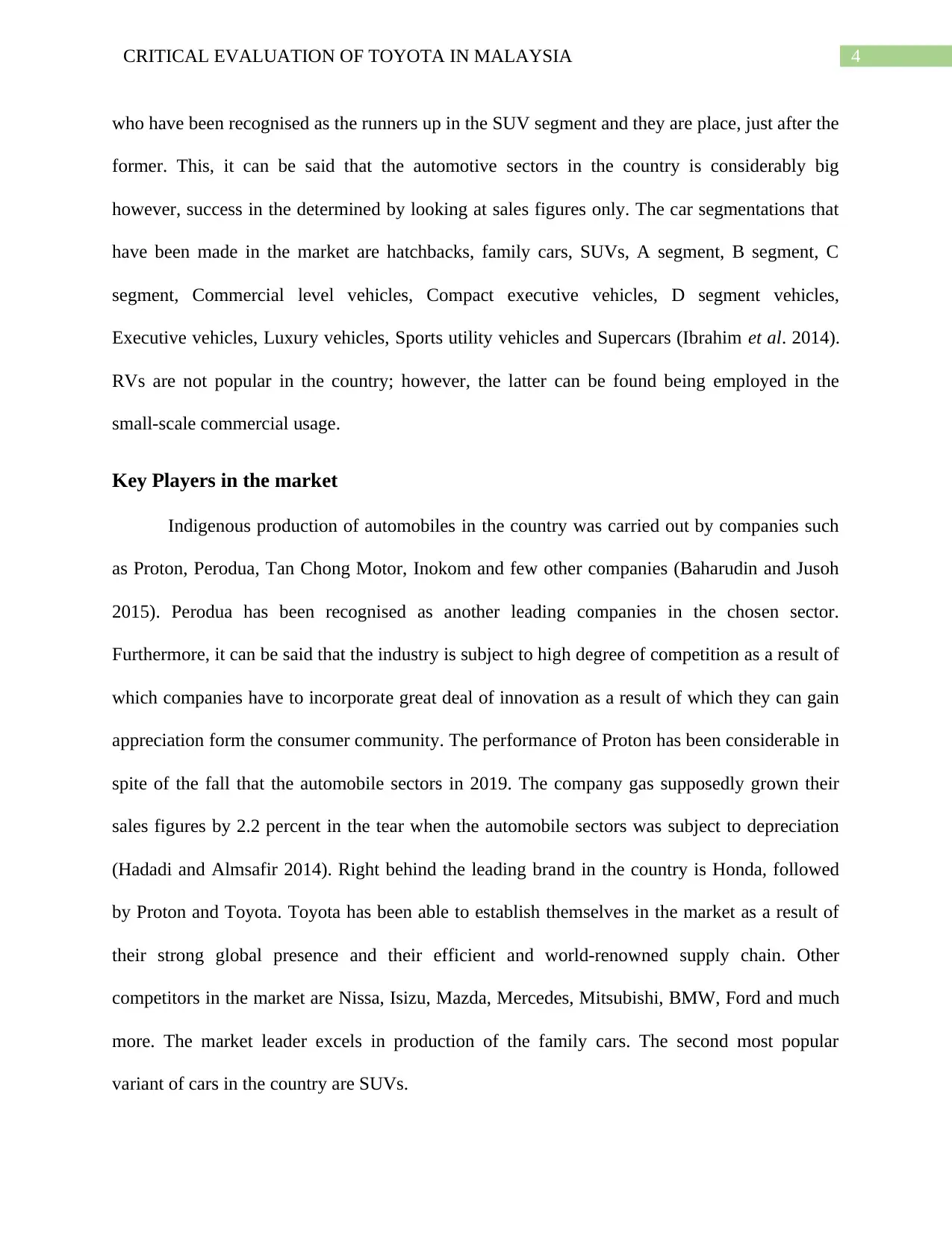
4CRITICAL EVALUATION OF TOYOTA IN MALAYSIA
who have been recognised as the runners up in the SUV segment and they are place, just after the
former. This, it can be said that the automotive sectors in the country is considerably big
however, success in the determined by looking at sales figures only. The car segmentations that
have been made in the market are hatchbacks, family cars, SUVs, A segment, B segment, C
segment, Commercial level vehicles, Compact executive vehicles, D segment vehicles,
Executive vehicles, Luxury vehicles, Sports utility vehicles and Supercars (Ibrahim et al. 2014).
RVs are not popular in the country; however, the latter can be found being employed in the
small-scale commercial usage.
Key Players in the market
Indigenous production of automobiles in the country was carried out by companies such
as Proton, Perodua, Tan Chong Motor, Inokom and few other companies (Baharudin and Jusoh
2015). Perodua has been recognised as another leading companies in the chosen sector.
Furthermore, it can be said that the industry is subject to high degree of competition as a result of
which companies have to incorporate great deal of innovation as a result of which they can gain
appreciation form the consumer community. The performance of Proton has been considerable in
spite of the fall that the automobile sectors in 2019. The company gas supposedly grown their
sales figures by 2.2 percent in the tear when the automobile sectors was subject to depreciation
(Hadadi and Almsafir 2014). Right behind the leading brand in the country is Honda, followed
by Proton and Toyota. Toyota has been able to establish themselves in the market as a result of
their strong global presence and their efficient and world-renowned supply chain. Other
competitors in the market are Nissa, Isizu, Mazda, Mercedes, Mitsubishi, BMW, Ford and much
more. The market leader excels in production of the family cars. The second most popular
variant of cars in the country are SUVs.
who have been recognised as the runners up in the SUV segment and they are place, just after the
former. This, it can be said that the automotive sectors in the country is considerably big
however, success in the determined by looking at sales figures only. The car segmentations that
have been made in the market are hatchbacks, family cars, SUVs, A segment, B segment, C
segment, Commercial level vehicles, Compact executive vehicles, D segment vehicles,
Executive vehicles, Luxury vehicles, Sports utility vehicles and Supercars (Ibrahim et al. 2014).
RVs are not popular in the country; however, the latter can be found being employed in the
small-scale commercial usage.
Key Players in the market
Indigenous production of automobiles in the country was carried out by companies such
as Proton, Perodua, Tan Chong Motor, Inokom and few other companies (Baharudin and Jusoh
2015). Perodua has been recognised as another leading companies in the chosen sector.
Furthermore, it can be said that the industry is subject to high degree of competition as a result of
which companies have to incorporate great deal of innovation as a result of which they can gain
appreciation form the consumer community. The performance of Proton has been considerable in
spite of the fall that the automobile sectors in 2019. The company gas supposedly grown their
sales figures by 2.2 percent in the tear when the automobile sectors was subject to depreciation
(Hadadi and Almsafir 2014). Right behind the leading brand in the country is Honda, followed
by Proton and Toyota. Toyota has been able to establish themselves in the market as a result of
their strong global presence and their efficient and world-renowned supply chain. Other
competitors in the market are Nissa, Isizu, Mazda, Mercedes, Mitsubishi, BMW, Ford and much
more. The market leader excels in production of the family cars. The second most popular
variant of cars in the country are SUVs.
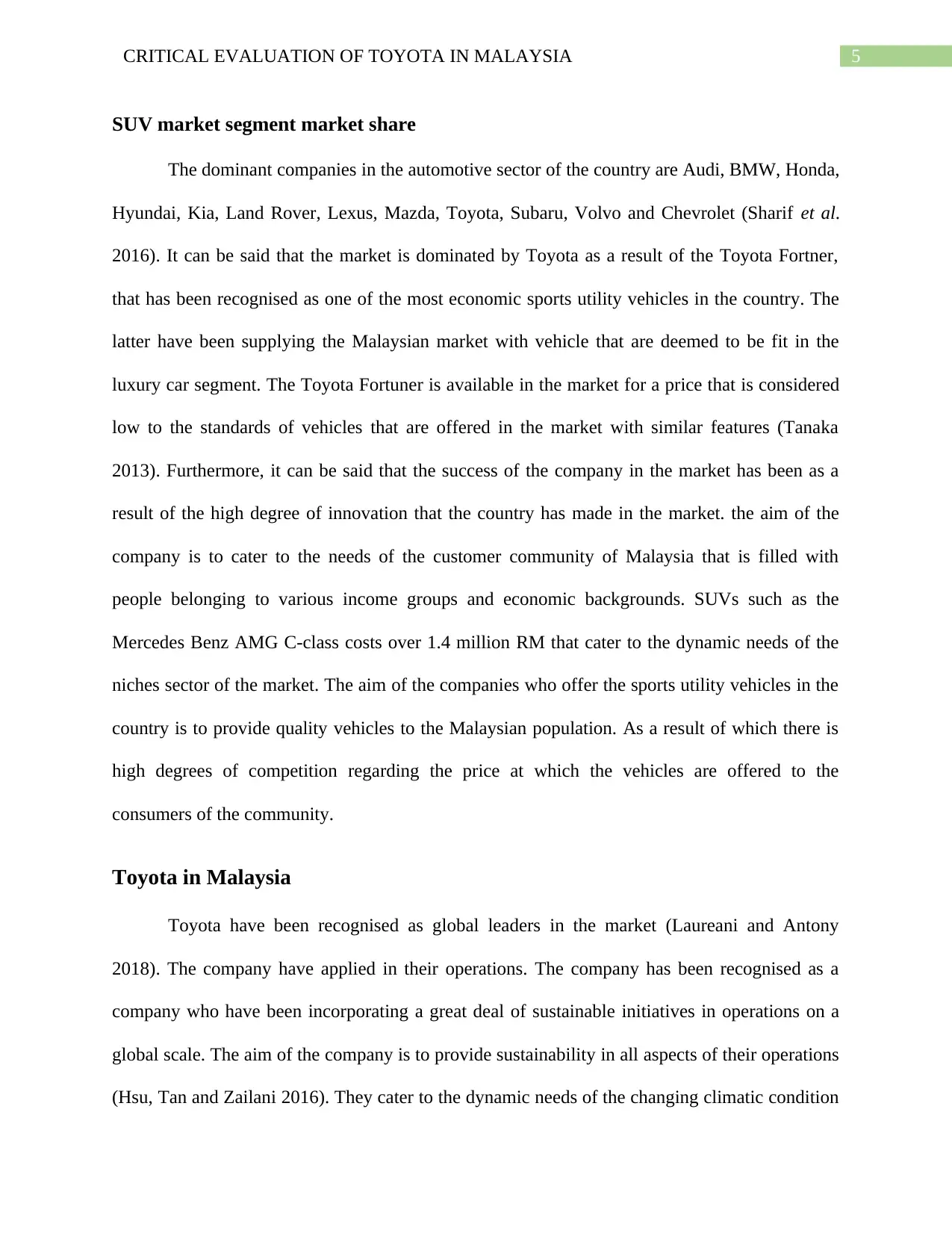
5CRITICAL EVALUATION OF TOYOTA IN MALAYSIA
SUV market segment market share
The dominant companies in the automotive sector of the country are Audi, BMW, Honda,
Hyundai, Kia, Land Rover, Lexus, Mazda, Toyota, Subaru, Volvo and Chevrolet (Sharif et al.
2016). It can be said that the market is dominated by Toyota as a result of the Toyota Fortner,
that has been recognised as one of the most economic sports utility vehicles in the country. The
latter have been supplying the Malaysian market with vehicle that are deemed to be fit in the
luxury car segment. The Toyota Fortuner is available in the market for a price that is considered
low to the standards of vehicles that are offered in the market with similar features (Tanaka
2013). Furthermore, it can be said that the success of the company in the market has been as a
result of the high degree of innovation that the country has made in the market. the aim of the
company is to cater to the needs of the customer community of Malaysia that is filled with
people belonging to various income groups and economic backgrounds. SUVs such as the
Mercedes Benz AMG C-class costs over 1.4 million RM that cater to the dynamic needs of the
niches sector of the market. The aim of the companies who offer the sports utility vehicles in the
country is to provide quality vehicles to the Malaysian population. As a result of which there is
high degrees of competition regarding the price at which the vehicles are offered to the
consumers of the community.
Toyota in Malaysia
Toyota have been recognised as global leaders in the market (Laureani and Antony
2018). The company have applied in their operations. The company has been recognised as a
company who have been incorporating a great deal of sustainable initiatives in operations on a
global scale. The aim of the company is to provide sustainability in all aspects of their operations
(Hsu, Tan and Zailani 2016). They cater to the dynamic needs of the changing climatic condition
SUV market segment market share
The dominant companies in the automotive sector of the country are Audi, BMW, Honda,
Hyundai, Kia, Land Rover, Lexus, Mazda, Toyota, Subaru, Volvo and Chevrolet (Sharif et al.
2016). It can be said that the market is dominated by Toyota as a result of the Toyota Fortner,
that has been recognised as one of the most economic sports utility vehicles in the country. The
latter have been supplying the Malaysian market with vehicle that are deemed to be fit in the
luxury car segment. The Toyota Fortuner is available in the market for a price that is considered
low to the standards of vehicles that are offered in the market with similar features (Tanaka
2013). Furthermore, it can be said that the success of the company in the market has been as a
result of the high degree of innovation that the country has made in the market. the aim of the
company is to cater to the needs of the customer community of Malaysia that is filled with
people belonging to various income groups and economic backgrounds. SUVs such as the
Mercedes Benz AMG C-class costs over 1.4 million RM that cater to the dynamic needs of the
niches sector of the market. The aim of the companies who offer the sports utility vehicles in the
country is to provide quality vehicles to the Malaysian population. As a result of which there is
high degrees of competition regarding the price at which the vehicles are offered to the
consumers of the community.
Toyota in Malaysia
Toyota have been recognised as global leaders in the market (Laureani and Antony
2018). The company have applied in their operations. The company has been recognised as a
company who have been incorporating a great deal of sustainable initiatives in operations on a
global scale. The aim of the company is to provide sustainability in all aspects of their operations
(Hsu, Tan and Zailani 2016). They cater to the dynamic needs of the changing climatic condition
⊘ This is a preview!⊘
Do you want full access?
Subscribe today to unlock all pages.

Trusted by 1+ million students worldwide
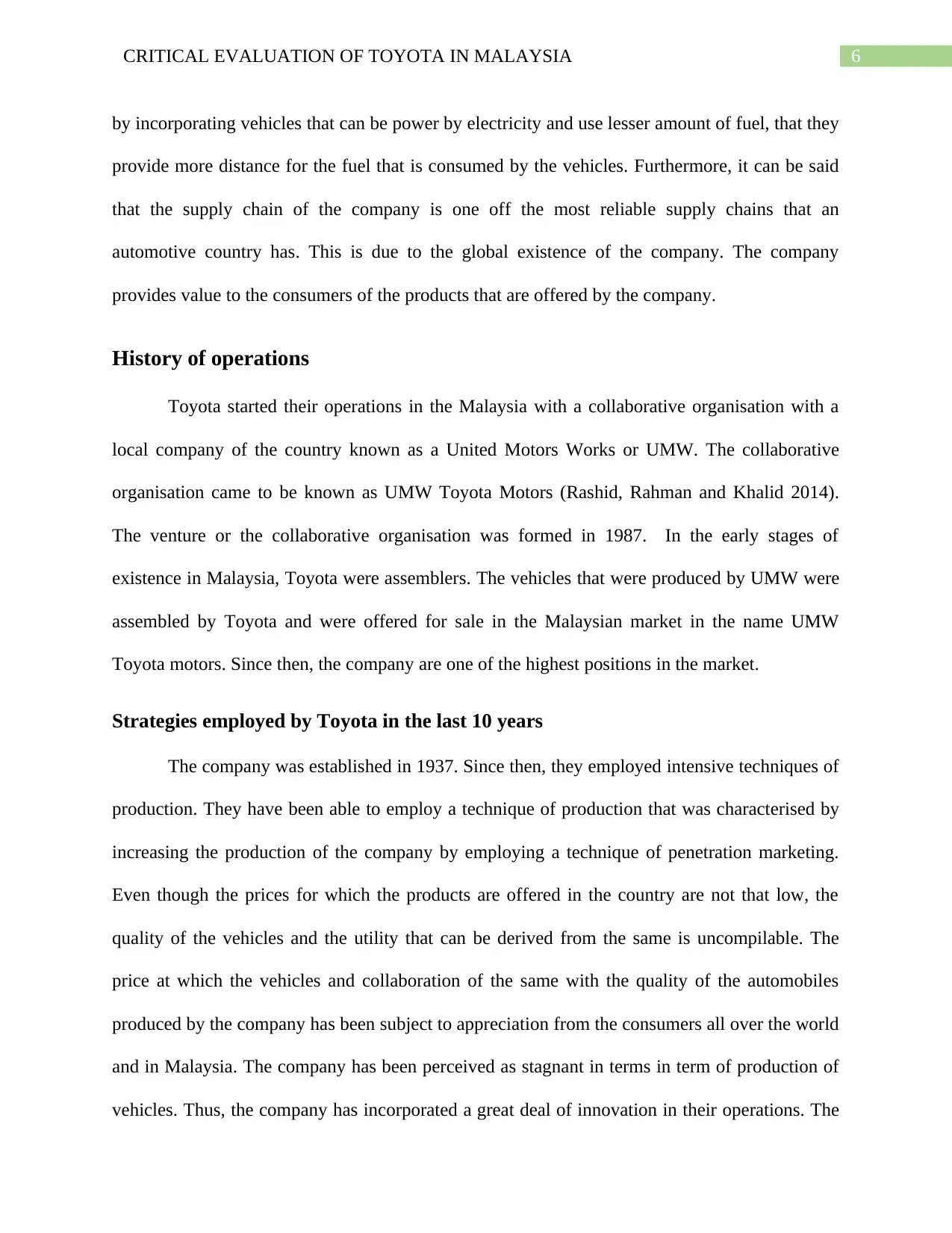
6CRITICAL EVALUATION OF TOYOTA IN MALAYSIA
by incorporating vehicles that can be power by electricity and use lesser amount of fuel, that they
provide more distance for the fuel that is consumed by the vehicles. Furthermore, it can be said
that the supply chain of the company is one off the most reliable supply chains that an
automotive country has. This is due to the global existence of the company. The company
provides value to the consumers of the products that are offered by the company.
History of operations
Toyota started their operations in the Malaysia with a collaborative organisation with a
local company of the country known as a United Motors Works or UMW. The collaborative
organisation came to be known as UMW Toyota Motors (Rashid, Rahman and Khalid 2014).
The venture or the collaborative organisation was formed in 1987. In the early stages of
existence in Malaysia, Toyota were assemblers. The vehicles that were produced by UMW were
assembled by Toyota and were offered for sale in the Malaysian market in the name UMW
Toyota motors. Since then, the company are one of the highest positions in the market.
Strategies employed by Toyota in the last 10 years
The company was established in 1937. Since then, they employed intensive techniques of
production. They have been able to employ a technique of production that was characterised by
increasing the production of the company by employing a technique of penetration marketing.
Even though the prices for which the products are offered in the country are not that low, the
quality of the vehicles and the utility that can be derived from the same is uncompilable. The
price at which the vehicles and collaboration of the same with the quality of the automobiles
produced by the company has been subject to appreciation from the consumers all over the world
and in Malaysia. The company has been perceived as stagnant in terms in term of production of
vehicles. Thus, the company has incorporated a great deal of innovation in their operations. The
by incorporating vehicles that can be power by electricity and use lesser amount of fuel, that they
provide more distance for the fuel that is consumed by the vehicles. Furthermore, it can be said
that the supply chain of the company is one off the most reliable supply chains that an
automotive country has. This is due to the global existence of the company. The company
provides value to the consumers of the products that are offered by the company.
History of operations
Toyota started their operations in the Malaysia with a collaborative organisation with a
local company of the country known as a United Motors Works or UMW. The collaborative
organisation came to be known as UMW Toyota Motors (Rashid, Rahman and Khalid 2014).
The venture or the collaborative organisation was formed in 1987. In the early stages of
existence in Malaysia, Toyota were assemblers. The vehicles that were produced by UMW were
assembled by Toyota and were offered for sale in the Malaysian market in the name UMW
Toyota motors. Since then, the company are one of the highest positions in the market.
Strategies employed by Toyota in the last 10 years
The company was established in 1937. Since then, they employed intensive techniques of
production. They have been able to employ a technique of production that was characterised by
increasing the production of the company by employing a technique of penetration marketing.
Even though the prices for which the products are offered in the country are not that low, the
quality of the vehicles and the utility that can be derived from the same is uncompilable. The
price at which the vehicles and collaboration of the same with the quality of the automobiles
produced by the company has been subject to appreciation from the consumers all over the world
and in Malaysia. The company has been perceived as stagnant in terms in term of production of
vehicles. Thus, the company has incorporated a great deal of innovation in their operations. The
Paraphrase This Document
Need a fresh take? Get an instant paraphrase of this document with our AI Paraphraser
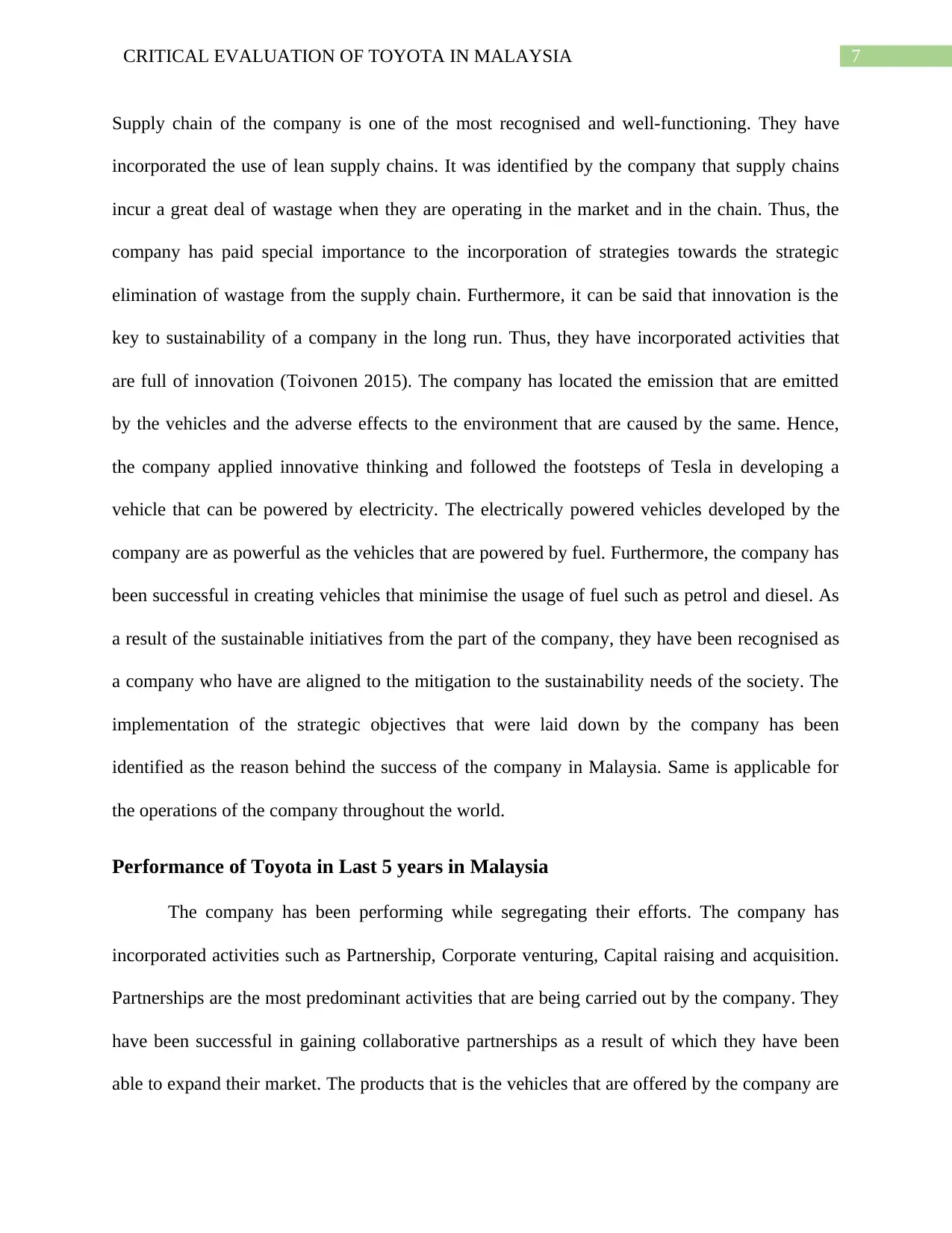
7CRITICAL EVALUATION OF TOYOTA IN MALAYSIA
Supply chain of the company is one of the most recognised and well-functioning. They have
incorporated the use of lean supply chains. It was identified by the company that supply chains
incur a great deal of wastage when they are operating in the market and in the chain. Thus, the
company has paid special importance to the incorporation of strategies towards the strategic
elimination of wastage from the supply chain. Furthermore, it can be said that innovation is the
key to sustainability of a company in the long run. Thus, they have incorporated activities that
are full of innovation (Toivonen 2015). The company has located the emission that are emitted
by the vehicles and the adverse effects to the environment that are caused by the same. Hence,
the company applied innovative thinking and followed the footsteps of Tesla in developing a
vehicle that can be powered by electricity. The electrically powered vehicles developed by the
company are as powerful as the vehicles that are powered by fuel. Furthermore, the company has
been successful in creating vehicles that minimise the usage of fuel such as petrol and diesel. As
a result of the sustainable initiatives from the part of the company, they have been recognised as
a company who have are aligned to the mitigation to the sustainability needs of the society. The
implementation of the strategic objectives that were laid down by the company has been
identified as the reason behind the success of the company in Malaysia. Same is applicable for
the operations of the company throughout the world.
Performance of Toyota in Last 5 years in Malaysia
The company has been performing while segregating their efforts. The company has
incorporated activities such as Partnership, Corporate venturing, Capital raising and acquisition.
Partnerships are the most predominant activities that are being carried out by the company. They
have been successful in gaining collaborative partnerships as a result of which they have been
able to expand their market. The products that is the vehicles that are offered by the company are
Supply chain of the company is one of the most recognised and well-functioning. They have
incorporated the use of lean supply chains. It was identified by the company that supply chains
incur a great deal of wastage when they are operating in the market and in the chain. Thus, the
company has paid special importance to the incorporation of strategies towards the strategic
elimination of wastage from the supply chain. Furthermore, it can be said that innovation is the
key to sustainability of a company in the long run. Thus, they have incorporated activities that
are full of innovation (Toivonen 2015). The company has located the emission that are emitted
by the vehicles and the adverse effects to the environment that are caused by the same. Hence,
the company applied innovative thinking and followed the footsteps of Tesla in developing a
vehicle that can be powered by electricity. The electrically powered vehicles developed by the
company are as powerful as the vehicles that are powered by fuel. Furthermore, the company has
been successful in creating vehicles that minimise the usage of fuel such as petrol and diesel. As
a result of the sustainable initiatives from the part of the company, they have been recognised as
a company who have are aligned to the mitigation to the sustainability needs of the society. The
implementation of the strategic objectives that were laid down by the company has been
identified as the reason behind the success of the company in Malaysia. Same is applicable for
the operations of the company throughout the world.
Performance of Toyota in Last 5 years in Malaysia
The company has been performing while segregating their efforts. The company has
incorporated activities such as Partnership, Corporate venturing, Capital raising and acquisition.
Partnerships are the most predominant activities that are being carried out by the company. They
have been successful in gaining collaborative partnerships as a result of which they have been
able to expand their market. The products that is the vehicles that are offered by the company are
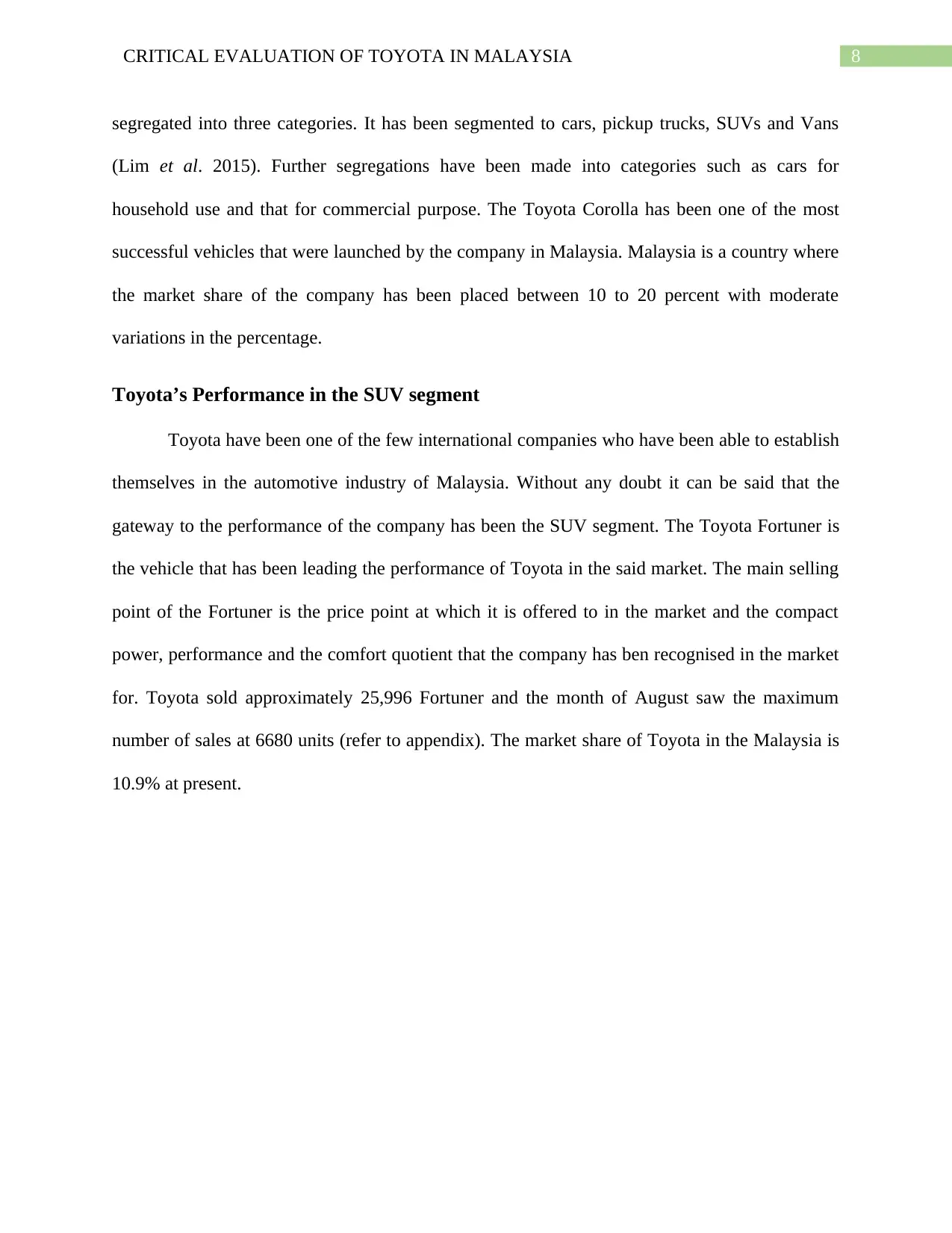
8CRITICAL EVALUATION OF TOYOTA IN MALAYSIA
segregated into three categories. It has been segmented to cars, pickup trucks, SUVs and Vans
(Lim et al. 2015). Further segregations have been made into categories such as cars for
household use and that for commercial purpose. The Toyota Corolla has been one of the most
successful vehicles that were launched by the company in Malaysia. Malaysia is a country where
the market share of the company has been placed between 10 to 20 percent with moderate
variations in the percentage.
Toyota’s Performance in the SUV segment
Toyota have been one of the few international companies who have been able to establish
themselves in the automotive industry of Malaysia. Without any doubt it can be said that the
gateway to the performance of the company has been the SUV segment. The Toyota Fortuner is
the vehicle that has been leading the performance of Toyota in the said market. The main selling
point of the Fortuner is the price point at which it is offered to in the market and the compact
power, performance and the comfort quotient that the company has ben recognised in the market
for. Toyota sold approximately 25,996 Fortuner and the month of August saw the maximum
number of sales at 6680 units (refer to appendix). The market share of Toyota in the Malaysia is
10.9% at present.
segregated into three categories. It has been segmented to cars, pickup trucks, SUVs and Vans
(Lim et al. 2015). Further segregations have been made into categories such as cars for
household use and that for commercial purpose. The Toyota Corolla has been one of the most
successful vehicles that were launched by the company in Malaysia. Malaysia is a country where
the market share of the company has been placed between 10 to 20 percent with moderate
variations in the percentage.
Toyota’s Performance in the SUV segment
Toyota have been one of the few international companies who have been able to establish
themselves in the automotive industry of Malaysia. Without any doubt it can be said that the
gateway to the performance of the company has been the SUV segment. The Toyota Fortuner is
the vehicle that has been leading the performance of Toyota in the said market. The main selling
point of the Fortuner is the price point at which it is offered to in the market and the compact
power, performance and the comfort quotient that the company has ben recognised in the market
for. Toyota sold approximately 25,996 Fortuner and the month of August saw the maximum
number of sales at 6680 units (refer to appendix). The market share of Toyota in the Malaysia is
10.9% at present.
⊘ This is a preview!⊘
Do you want full access?
Subscribe today to unlock all pages.

Trusted by 1+ million students worldwide
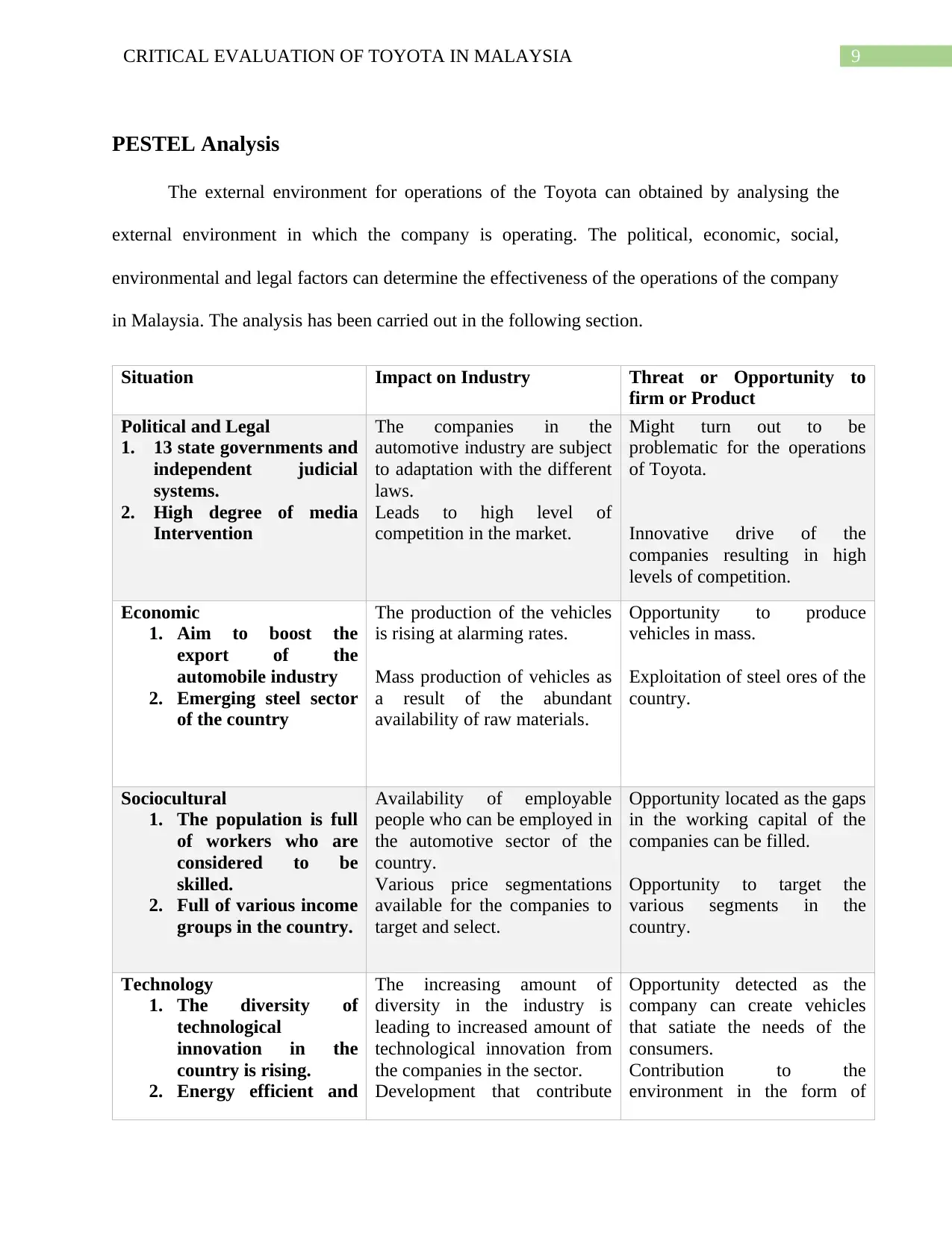
9CRITICAL EVALUATION OF TOYOTA IN MALAYSIA
PESTEL Analysis
The external environment for operations of the Toyota can obtained by analysing the
external environment in which the company is operating. The political, economic, social,
environmental and legal factors can determine the effectiveness of the operations of the company
in Malaysia. The analysis has been carried out in the following section.
Situation Impact on Industry Threat or Opportunity to
firm or Product
Political and Legal
1. 13 state governments and
independent judicial
systems.
2. High degree of media
Intervention
The companies in the
automotive industry are subject
to adaptation with the different
laws.
Leads to high level of
competition in the market.
Might turn out to be
problematic for the operations
of Toyota.
Innovative drive of the
companies resulting in high
levels of competition.
Economic
1. Aim to boost the
export of the
automobile industry
2. Emerging steel sector
of the country
The production of the vehicles
is rising at alarming rates.
Mass production of vehicles as
a result of the abundant
availability of raw materials.
Opportunity to produce
vehicles in mass.
Exploitation of steel ores of the
country.
Sociocultural
1. The population is full
of workers who are
considered to be
skilled.
2. Full of various income
groups in the country.
Availability of employable
people who can be employed in
the automotive sector of the
country.
Various price segmentations
available for the companies to
target and select.
Opportunity located as the gaps
in the working capital of the
companies can be filled.
Opportunity to target the
various segments in the
country.
Technology
1. The diversity of
technological
innovation in the
country is rising.
2. Energy efficient and
The increasing amount of
diversity in the industry is
leading to increased amount of
technological innovation from
the companies in the sector.
Development that contribute
Opportunity detected as the
company can create vehicles
that satiate the needs of the
consumers.
Contribution to the
environment in the form of
PESTEL Analysis
The external environment for operations of the Toyota can obtained by analysing the
external environment in which the company is operating. The political, economic, social,
environmental and legal factors can determine the effectiveness of the operations of the company
in Malaysia. The analysis has been carried out in the following section.
Situation Impact on Industry Threat or Opportunity to
firm or Product
Political and Legal
1. 13 state governments and
independent judicial
systems.
2. High degree of media
Intervention
The companies in the
automotive industry are subject
to adaptation with the different
laws.
Leads to high level of
competition in the market.
Might turn out to be
problematic for the operations
of Toyota.
Innovative drive of the
companies resulting in high
levels of competition.
Economic
1. Aim to boost the
export of the
automobile industry
2. Emerging steel sector
of the country
The production of the vehicles
is rising at alarming rates.
Mass production of vehicles as
a result of the abundant
availability of raw materials.
Opportunity to produce
vehicles in mass.
Exploitation of steel ores of the
country.
Sociocultural
1. The population is full
of workers who are
considered to be
skilled.
2. Full of various income
groups in the country.
Availability of employable
people who can be employed in
the automotive sector of the
country.
Various price segmentations
available for the companies to
target and select.
Opportunity located as the gaps
in the working capital of the
companies can be filled.
Opportunity to target the
various segments in the
country.
Technology
1. The diversity of
technological
innovation in the
country is rising.
2. Energy efficient and
The increasing amount of
diversity in the industry is
leading to increased amount of
technological innovation from
the companies in the sector.
Development that contribute
Opportunity detected as the
company can create vehicles
that satiate the needs of the
consumers.
Contribution to the
environment in the form of
Paraphrase This Document
Need a fresh take? Get an instant paraphrase of this document with our AI Paraphraser
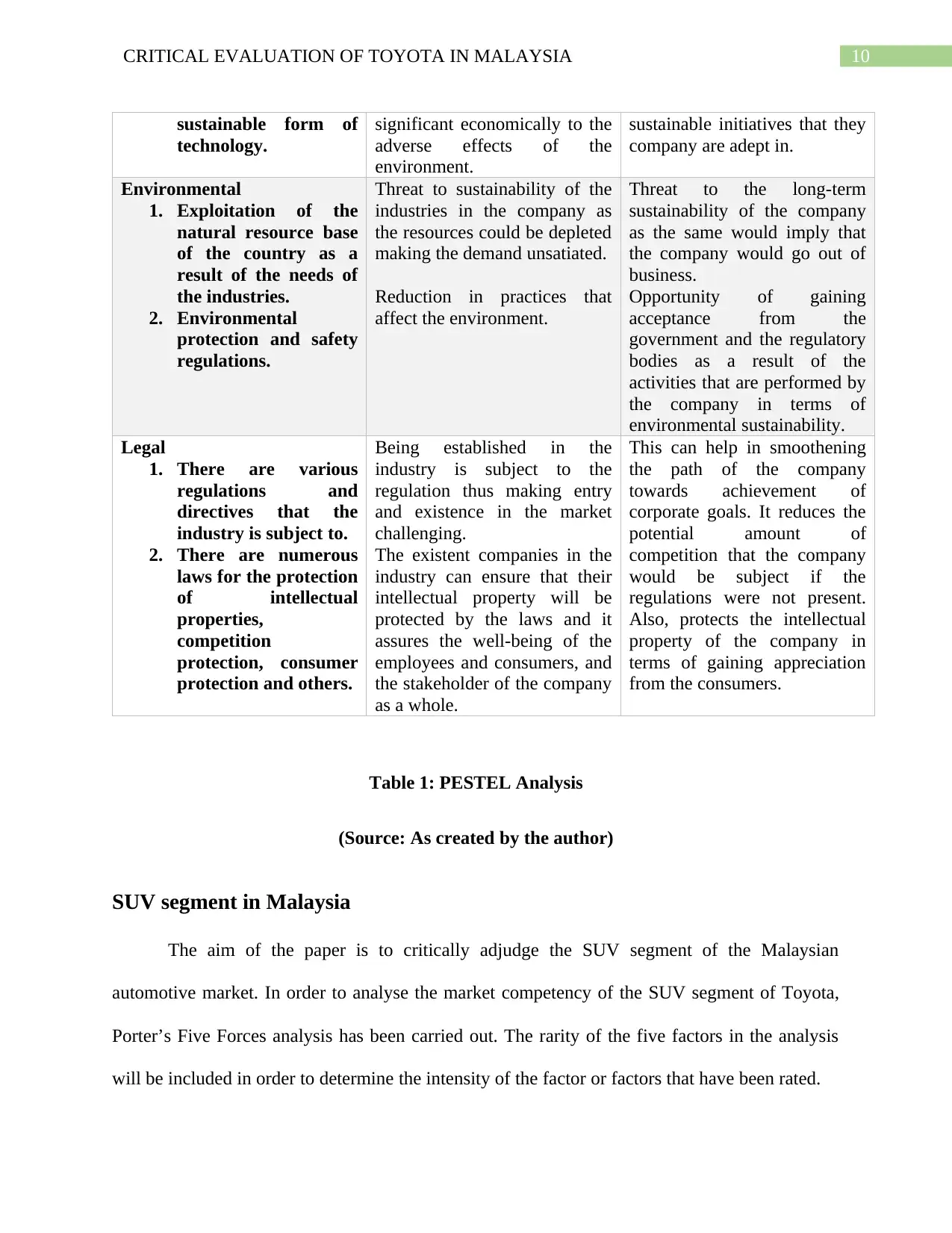
10CRITICAL EVALUATION OF TOYOTA IN MALAYSIA
sustainable form of
technology.
significant economically to the
adverse effects of the
environment.
sustainable initiatives that they
company are adept in.
Environmental
1. Exploitation of the
natural resource base
of the country as a
result of the needs of
the industries.
2. Environmental
protection and safety
regulations.
Threat to sustainability of the
industries in the company as
the resources could be depleted
making the demand unsatiated.
Reduction in practices that
affect the environment.
Threat to the long-term
sustainability of the company
as the same would imply that
the company would go out of
business.
Opportunity of gaining
acceptance from the
government and the regulatory
bodies as a result of the
activities that are performed by
the company in terms of
environmental sustainability.
Legal
1. There are various
regulations and
directives that the
industry is subject to.
2. There are numerous
laws for the protection
of intellectual
properties,
competition
protection, consumer
protection and others.
Being established in the
industry is subject to the
regulation thus making entry
and existence in the market
challenging.
The existent companies in the
industry can ensure that their
intellectual property will be
protected by the laws and it
assures the well-being of the
employees and consumers, and
the stakeholder of the company
as a whole.
This can help in smoothening
the path of the company
towards achievement of
corporate goals. It reduces the
potential amount of
competition that the company
would be subject if the
regulations were not present.
Also, protects the intellectual
property of the company in
terms of gaining appreciation
from the consumers.
Table 1: PESTEL Analysis
(Source: As created by the author)
SUV segment in Malaysia
The aim of the paper is to critically adjudge the SUV segment of the Malaysian
automotive market. In order to analyse the market competency of the SUV segment of Toyota,
Porter’s Five Forces analysis has been carried out. The rarity of the five factors in the analysis
will be included in order to determine the intensity of the factor or factors that have been rated.
sustainable form of
technology.
significant economically to the
adverse effects of the
environment.
sustainable initiatives that they
company are adept in.
Environmental
1. Exploitation of the
natural resource base
of the country as a
result of the needs of
the industries.
2. Environmental
protection and safety
regulations.
Threat to sustainability of the
industries in the company as
the resources could be depleted
making the demand unsatiated.
Reduction in practices that
affect the environment.
Threat to the long-term
sustainability of the company
as the same would imply that
the company would go out of
business.
Opportunity of gaining
acceptance from the
government and the regulatory
bodies as a result of the
activities that are performed by
the company in terms of
environmental sustainability.
Legal
1. There are various
regulations and
directives that the
industry is subject to.
2. There are numerous
laws for the protection
of intellectual
properties,
competition
protection, consumer
protection and others.
Being established in the
industry is subject to the
regulation thus making entry
and existence in the market
challenging.
The existent companies in the
industry can ensure that their
intellectual property will be
protected by the laws and it
assures the well-being of the
employees and consumers, and
the stakeholder of the company
as a whole.
This can help in smoothening
the path of the company
towards achievement of
corporate goals. It reduces the
potential amount of
competition that the company
would be subject if the
regulations were not present.
Also, protects the intellectual
property of the company in
terms of gaining appreciation
from the consumers.
Table 1: PESTEL Analysis
(Source: As created by the author)
SUV segment in Malaysia
The aim of the paper is to critically adjudge the SUV segment of the Malaysian
automotive market. In order to analyse the market competency of the SUV segment of Toyota,
Porter’s Five Forces analysis has been carried out. The rarity of the five factors in the analysis
will be included in order to determine the intensity of the factor or factors that have been rated.
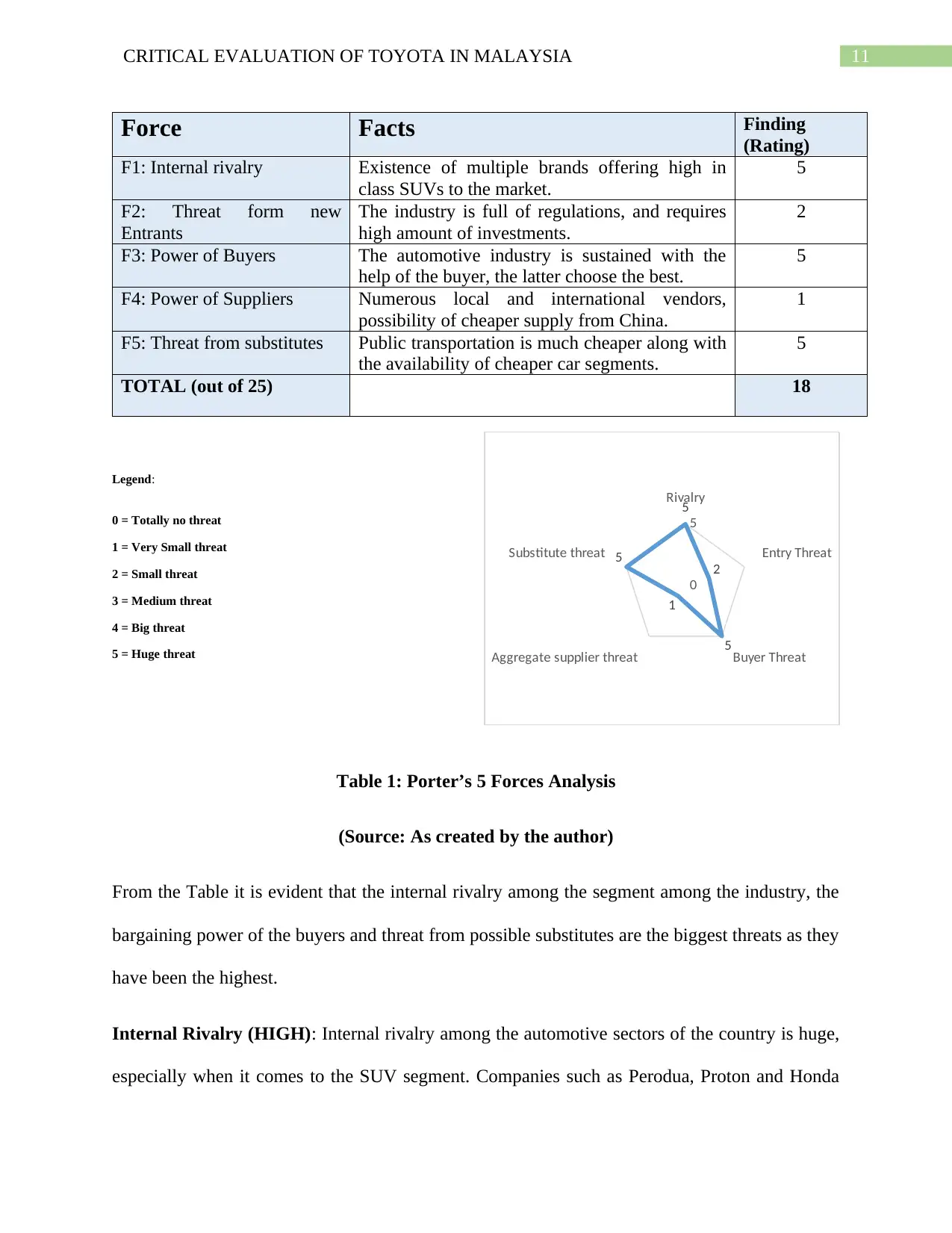
11CRITICAL EVALUATION OF TOYOTA IN MALAYSIA
Force Facts Finding
(Rating)
F1: Internal rivalry Existence of multiple brands offering high in
class SUVs to the market.
5
F2: Threat form new
Entrants
The industry is full of regulations, and requires
high amount of investments.
2
F3: Power of Buyers The automotive industry is sustained with the
help of the buyer, the latter choose the best.
5
F4: Power of Suppliers Numerous local and international vendors,
possibility of cheaper supply from China.
1
F5: Threat from substitutes Public transportation is much cheaper along with
the availability of cheaper car segments.
5
TOTAL (out of 25) 18
Legend:
0 = Totally no threat
1 = Very Small threat
2 = Small threat
3 = Medium threat
4 = Big threat
5 = Huge threat
Table 1: Porter’s 5 Forces Analysis
(Source: As created by the author)
From the Table it is evident that the internal rivalry among the segment among the industry, the
bargaining power of the buyers and threat from possible substitutes are the biggest threats as they
have been the highest.
Internal Rivalry (HIGH): Internal rivalry among the automotive sectors of the country is huge,
especially when it comes to the SUV segment. Companies such as Perodua, Proton and Honda
Rivalry
Entry Threat
Buyer ThreatAggregate supplier threat
Substitute threat
0
5
5
2
5
1
5
Force Facts Finding
(Rating)
F1: Internal rivalry Existence of multiple brands offering high in
class SUVs to the market.
5
F2: Threat form new
Entrants
The industry is full of regulations, and requires
high amount of investments.
2
F3: Power of Buyers The automotive industry is sustained with the
help of the buyer, the latter choose the best.
5
F4: Power of Suppliers Numerous local and international vendors,
possibility of cheaper supply from China.
1
F5: Threat from substitutes Public transportation is much cheaper along with
the availability of cheaper car segments.
5
TOTAL (out of 25) 18
Legend:
0 = Totally no threat
1 = Very Small threat
2 = Small threat
3 = Medium threat
4 = Big threat
5 = Huge threat
Table 1: Porter’s 5 Forces Analysis
(Source: As created by the author)
From the Table it is evident that the internal rivalry among the segment among the industry, the
bargaining power of the buyers and threat from possible substitutes are the biggest threats as they
have been the highest.
Internal Rivalry (HIGH): Internal rivalry among the automotive sectors of the country is huge,
especially when it comes to the SUV segment. Companies such as Perodua, Proton and Honda
Rivalry
Entry Threat
Buyer ThreatAggregate supplier threat
Substitute threat
0
5
5
2
5
1
5
⊘ This is a preview!⊘
Do you want full access?
Subscribe today to unlock all pages.

Trusted by 1+ million students worldwide
1 out of 24
Related Documents
Your All-in-One AI-Powered Toolkit for Academic Success.
+13062052269
info@desklib.com
Available 24*7 on WhatsApp / Email
![[object Object]](/_next/static/media/star-bottom.7253800d.svg)
Unlock your academic potential
Copyright © 2020–2026 A2Z Services. All Rights Reserved. Developed and managed by ZUCOL.





